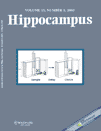Hippocampal lesions that abolish spatial maze performance spare object recognition memory at delays of up to 48 hours
Abstract
The hippocampus is widely considered to be a critical component of a medial temporal lobe memory system, necessary for normal performance on tests of declarative memory. Object recognition memory is thought to be a classic test of declarative memory function. However, previous tests of the effects of hippocampal lesions on object recognition memory have not always supported this view. One possible reason for this inconsistency is that previously reported effects of hippocampal lesions on object recognition memory tasks may have stemmed not from a deficit in object recognition memory per se, but as a result of spatial and contextual confounds in the task. Thus, in the present study, we used a spontaneous object recognition test in a modified apparatus designed to minimize spatial and contextual factors. A group of rats with complete excitotoxic lesions of the hippocampus and a group of control rats were tested on this modified spontaneous object recognition task with retention delays of up to 48 h. These rats were also tested on a spatial nonmatching-to-place task. Spatial memory performance was abolished following hippocampal lesions, whereas performance on the recognition memory task was intact at all delays tested. © 2004 Wiley-Liss, Inc.




